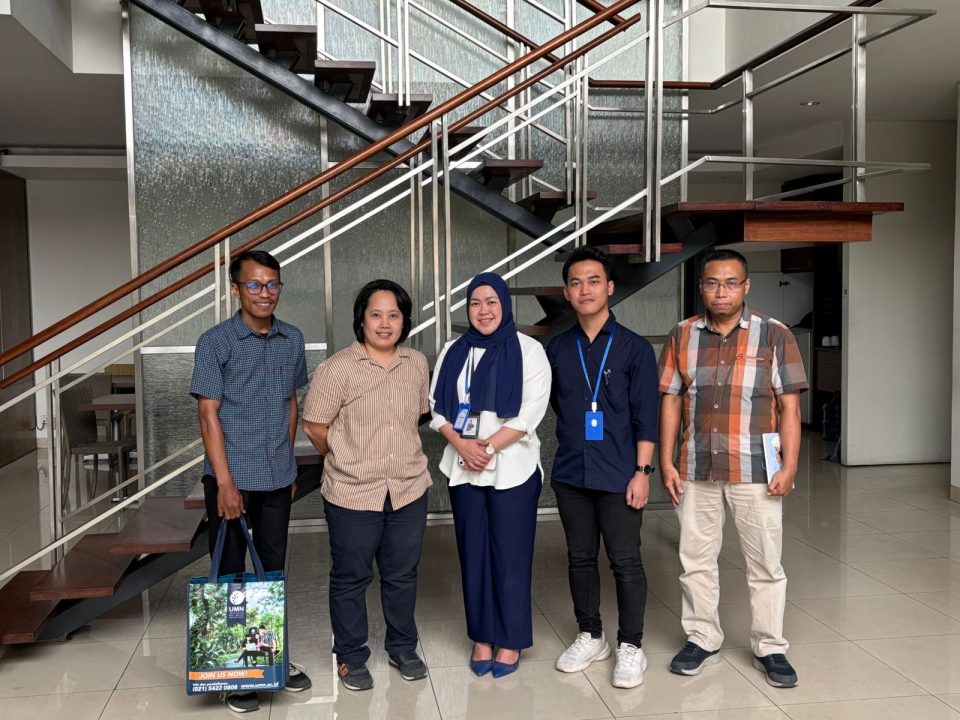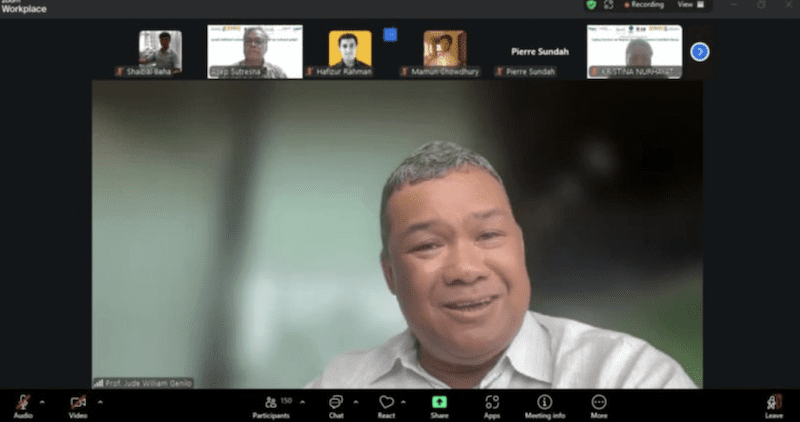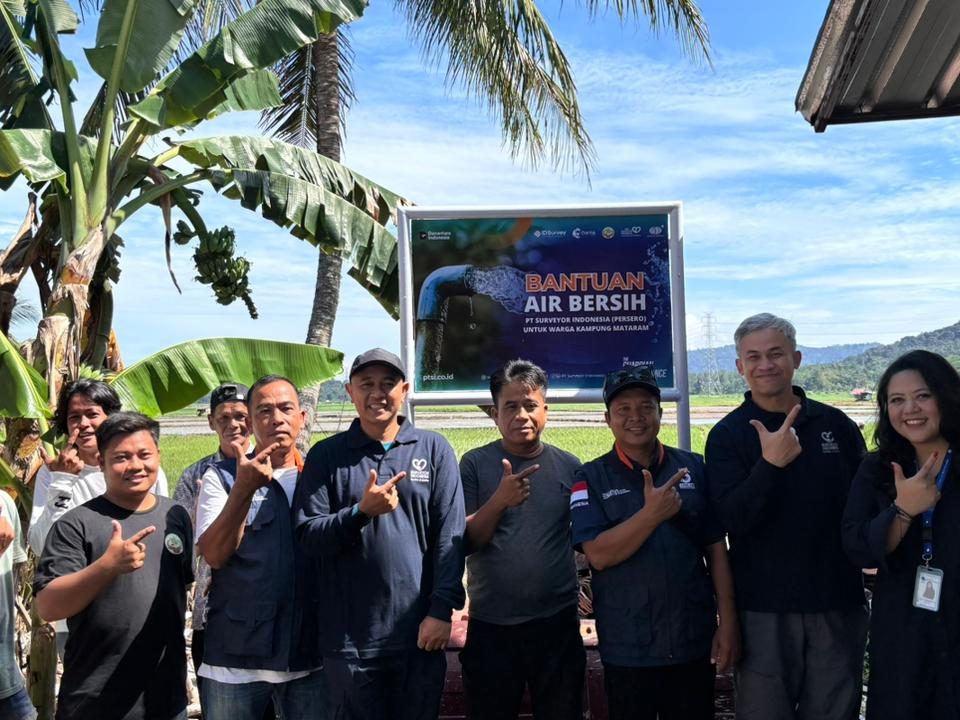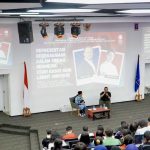
Inspirational Guest Lecture at UMN Communications Faculty with the Founder and CEO of Bumilangit Entertainment
November 21, 2025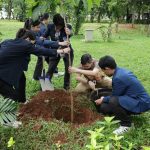
UMN Proves Its “Green Campus” Title Through Mass Tree Planting with Students
November 21, 2025
Group photo of UMN rectorate and senate chair with the BCA team. (Doc. UMN)
Tangerang, (14/11/2024) – Bank Central Asia (BCA) held a guest lecture entitled “The Art of Falling: ‘Ukemi’ as a Lesson for Life and Career” at the Universitas Multimedia Nusantara (UMN) campus. This activity is part of the BCA Berbagi Ilmu (BCA Sharing Knowledge) program, and was presented by Hendra Tan, Director of BCA. He encouraged students to understand failure and how to recover from it, as well as to understand failure from the perspective of the Aikido technique known as Ukemi.
BCA is one of UMN’s close industry partners, and currently, many programs have been carried out by UMN and BCA. As a commitment to the collaboration between BCA and UMN, this guest lecture is an implementation of the collaboration between UMN and BCA, as well as proof of the commitment of industry and educational institutions to continue providing quality education for Indonesia’s young generation. This guest lecture was opened by Dr. Andrey Andoko, Rector of UMN.
“This activity is very good and proves BCA’s concern for education. This topic is important for students, as we will definitely face failure in life or in the world of work later on. However, the most important thing is not how many times we fall and fail, but how brave we are to rise from failure. There are many examples in big business, as well as great figures who have failed many times but did not give up, as quoted by Thomas Edison: ‘Our greatest weakness lies in giving up. The certain way to succeed is always to try just one more time,’” Andrey said.
In this case, he advised students not to give up easily, especially in this era of digital disruption, particularly due to the development of Artificial Intelligence (AI) and the fact that many professions have become obsolete and have been replaced by AI. Andrey advised students to continue to be adaptive individuals and lifelong learners. This event was also opened by Eko Santini as the Head of the BCA Gading Serpong Branch.
“Currently, Indonesia is experiencing a demographic bonus, with data from DPS Indonesia showing that 24% of the population is young. With this demographic bonus, universities and industries have an important role to play in supporting education in Indonesia through the BCA Berbagi Ilmu program to realize Indonesia Emas in 2045,” Eko said.
For Eko, this activity is important for students and is a concrete step by the industry to prepare the younger generation for their careers. This activity is expected to complement what students have learned on campus and provide them with broader knowledge.
Ukemi teaches us to continue to rise from failure.

Group photo with the UMN rectorate and senate chair, along with the BCA team. (Doc. UMN)
Ukemi is a technique in the martial art of Aikido, and it is the most basic technique that must be learned. The Ukemi technique is a technique of how to throw an opponent using their energy, how to fall without feeling pain, and how to get back up again. In this guest lecture, Hendra explained through his experience in Aikido how Ukemi is not just a technique but also something that can be implemented in life.
“Ukemi taught me the principle of life that falling is something we cannot avoid, but how we get back up again is our choice. Falling is something beyond our control, but getting back up is our choice. Failure is divided into two circles of concern: things beyond our control and things close to us, so we must know which circle these factors of failure come from,” Hendra explained.
Hendra himself stated that he always learns to prepare himself for things beyond his control or to prepare himself within his circle of influence. Later, if there is a failure, we can understand the factors that caused the mistake. In addition, Hendra also explained how to respond to and deal with changes in the world.
“The world is constantly changing 99.7%. Today, we live in a connected world with many technological disruptions emerging. Technological advances lead us to innovate new things, but at the same time, they also cause anxiety for the younger generation. Anxiety about failure is a phenomenon that is currently occurring not only in careers but also in small matters,” Hendra added.
According to Hendra, this anxiety can cause us to fall, but at the same time, global change is something that cannot be avoided, but we can change ourselves. Innovations and disruptions will continue to emerge, and as students, we must be willing to learn new things.
“In facing these changes, you can emphasize the importance of remaining aware of opportunities and the possibility of failure, and accepting rather than rejecting the current situation, especially in the rapidly changing world of work. Adaptability is also important, adapting to changes as they occur, so that in the future you will always be ready for new changes,” Hendra added.
In his closing remarks, Hendra also shared various life lessons: failure in life is not the end of everything, but rather feedback. The second lesson is to go with the flow and not resist new changes.
“True strength is not about never failing, but knowing how to fail and rise again. Never stop learning and continue to develop your character. Be a person who can endure and excel in a constantly changing life,” Hendra concluded.
By Rachel Tiffany | UMN News Service
English translation by Levina Chrestella Theodora
Kuliah di Jakarta untuk jurusan program studi Informatika| Sistem Informasi | Teknik Komputer | Teknik Elektro | Teknik Fisika | Akuntansi | Manajemen| Komunikasi Strategis | Jurnalistik | Desain Komunikasi Visual | Film dan Animasi | Arsitektur | D3 Perhotelan , di Universitas Multimedia Nusantara.

